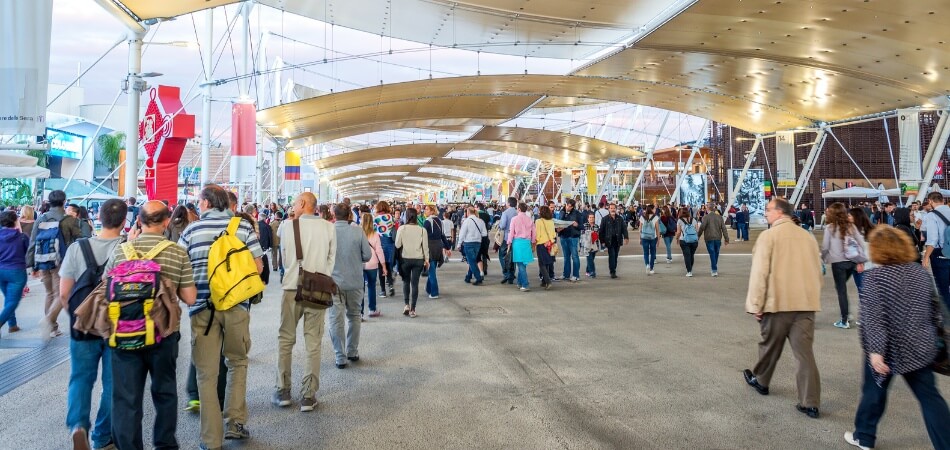Trade fairs and festivals are two distinct types of large gatherings in the dynamic landscape of large gatherings. Every experience is tailored to a specific audience, serving a unique purpose. Understanding the “difference between trade fairs and festivals” is vital to appreciating their significance.
Trade fairs are business-driven events emphasizing industry networking, product displays, and commercial transactions. Conversely, festivals are cultural celebrations teeming with entertainment, artistic expression, and community bonding.
This article aims to dissect these differences, offering insights into their objectives, and commercial endeavors at trade fairs against the backdrop of communal joy at festivals. Stay with us as we delve deeper into these contrasting worlds, inviting you to explore the nuances that set them apart. Join us on this informative journey and discover the distinct flavors of trade fairs and festivals.
A Brief Overview of the Trade Fair and Festival
Trade fairs are business-centric, focusing on commercial activities and industry advancements. In the realm of trade fairs, professionals from various industries converge to network, showcase products, and forge new business relationships. These events are pivotal for market expansion and innovation in the business world.

Festivals, on the other hand, are celebrations of culture, arts, and community spirit. It offers a kaleidoscope of cultural experiences, highlighting local traditions, entertainment, and artistic endeavors. They foster community bonding and provide a platform for creative expression.
Different Types of Trade Fairs
Trade fairs are dynamic platforms where businesses showcase their latest offerings and innovations. These events vary widely, catering to different industries and interests. Selecting the right trade fair for your business requires understanding the different types of fairs.
Consumer Trade Fairs
Consumer trade fairs are public events where companies present new products directly to consumers. They offer hands-on experiences, allowing visitors to try products before purchase. These fairs are ideal for launching consumer goods and gauging market response. They’re bustling hubs of customer interaction and product feedback.
Industry-Specific Trade Fairs
Focusing on specific industries, these trade fairs cater to professionals within a particular sector. They’re platforms for showcasing industry-specific advancements and trends. Attendees gain insights into the latest technologies and market shifts. These events foster B2B connections and industry-specific networking.
International Trade Fairs
International trade fairs are large-scale events attracting global participants. They facilitate cross-border business opportunities and cultural exchange. Such fairs offer a broader perspective on global market trends and innovations. They’re essential for businesses looking to expand internationally.
Virtual Trade Fairs
Adapting to modern technology, virtual trade fairs are conducted online. They offer the convenience of global accessibility without geographical constraints. These digital platforms are cost-effective, environmentally friendly, and easily navigable. Virtual fairs have gained popularity, especially in the digital and tech industries.
Trade fairs, in their various forms, provide unparalleled opportunities for business growth and networking. Whether in-person or virtual, industry-specific or international, each type of trade fair offers unique advantages. Selecting the right type can be a strategic move for any business aiming to expand its horizons.
Different Types of Festivals
Festivals are vibrant tapestries of human expression, each type reflecting a unique facet of culture, tradition, and joy. From music to food, these gatherings span a spectrum of themes. They not only entertain but also educate and connect communities across the globe.

Music Festivals
Music festivals are a symphony of diverse sounds, attracting fans from various genres. They showcase talents from local artists to international superstars. These events often include workshops, art installations, and eclectic food stalls. They’re a fusion of auditory and visual delights, celebrating the universal language of music.
Cultural Festivals
Cultural festivals are windows into the world’s rich heritage and traditions. They feature traditional dances, costumes, and rituals unique to a region. These festivals often coincide with historical or religious events, offering insight into local customs. They bridge gaps between generations and cultures, fostering a sense of global unity.
Food Festivals
Food festivals are a feast for the senses, highlighting culinary delights from around the world. They bring together chefs, food enthusiasts, and local vendors. These gatherings are platforms for culinary innovation and traditional cooking methods. They’re a journey of flavors, showcasing regional specialties and international cuisine.
Film Festivals
Film festivals are celebrations of cinematic art, showcasing a range of genres and styles. They provide a platform for filmmakers to present their work to a global audience. These festivals often include panel discussions, workshops, and networking events. They’re a convergence of creativity, fostering the growth of the film industry.
Festivals are more than just gatherings; they are a reflection of humanity’s diverse interests and cultural richness. Each type offers a unique experience, inviting people to explore, learn, and celebrate the myriad aspects of life. Whether through music, culture, food, or film, festivals bring together communities, bridging differences and creating shared experiences.
Difference Between Trade Fairs and Festivals- What are they?
Trade fairs and festivals are two distinct types of events that cater to different interests and objectives. While they both draw crowds and create lively atmospheres, their core purposes and activities vary significantly. The key to appreciating each experience is understanding the differences between them.

Objective and Focus
Trade fairs are primarily business-oriented platforms. They’re designed for companies to showcase new products, network with industry peers, and engage in trade. These events are crucial for market expansion, innovation, and professional collaborations.
Festivals, in contrast, are centered around cultural or celebratory experiences. They emphasize community involvement, arts, and entertainment, offering a space for relaxation and enjoyment. Festivals are more about experiencing culture and community spirit than engaging in business activities.
Audience and Activities
The audience at trade fairs usually comprises industry professionals, entrepreneurs, and business enthusiasts. Activities here are tailored toward product demonstrations, business meetings, and networking sessions. It’s a professional environment where deals are made and partnerships are formed.
Festivals attract a more diverse audience, from local families to international tourists. Activities range from music performances art exhibitions, to food tastings. These events are about immersing oneself in the joy of the moment and celebrating shared interests.
While both trade fairs and festivals offer unique and engaging experiences, they serve different purposes and cater to distinct audiences. Trade fairs are the go-to for professional networking and business growth, while festivals offer a celebration of culture, art, and community. Recognizing these differences helps individuals and businesses alike to choose the right type of event to attend, ensuring they meet their specific needs and interests.
Pros and Cons of Trade Fairs
Trade fairs are dynamic platforms for businesses, offering numerous benefits but also presenting certain challenges. These events serve as hubs for commercial activity, networking, and industry trends. However, participating in them requires careful consideration of both their advantages and limitations.
Pros
- Networking Opportunities: Connect with industry professionals, potential clients, and suppliers.
- Brand Exposure: Showcase products or services to a targeted audience.
- Market Insights: Gain valuable insights into current trends and consumer preferences.
- Competitive Analysis: Observe and learn from competitors’ offerings and strategies.
- Sales Opportunities: Generate leads and close sales directly at the event.
- Media Coverage: Attract media attention, enhancing brand visibility.
- Product Launches: Ideal platform for introducing new products to the market.
Cons
- Costly Investment: High costs for booth rental, design, staffing, and marketing materials.
- Time-Consuming: Preparation, participation, and follow-up require significant time investment.
- Variable ROI: Return on investment can be uncertain and varies greatly.
- Overwhelming Competition: Difficult to stand out among numerous exhibitors.
- Limited Audience: Reach is limited to attendees, missing broader market segments.
In summary, trade fairs present a unique blend of opportunities and challenges for businesses. They are valuable for networking, market insights, and direct sales but come with costs and competitive pressures. Companies must weigh these pros and cons to determine if participation aligns with their business strategy and goals.
Pros and Cons of Trade Festivals
Festivals are multifaceted events that bring joy and excitement to communities, but they also come with their own set of challenges. They serve as a platform for cultural expression and community engagement, offering various benefits while posing certain drawbacks. A balanced view of these vibrant gatherings requires an understanding of their pros and cons.
Pros
- Festivals promote cultural exchange, enhancing understanding and appreciation of diverse traditions and customs.
- They boost local economies by attracting tourists and encouraging spending in the area.
- Festivals provide a platform for artists and performers to showcase their talents to a wider audience.
- They foster community spirit and unity by bringing people together for shared experiences.
- Festivals can be a significant source of entertainment, offering a break from the routine of daily life.
- They offer educational experiences, teaching attendees about different cultures, arts, and historical events.
- Environmental awareness and sustainability can be promoted through eco-friendly festivals and green initiatives.
Cons
- Festivals can lead to environmental damage due to litter, pollution, and strain on local resources.
- They may cause noise pollution, disrupting the daily lives of residents in the vicinity.
- Large gatherings at festivals pose safety and security challenges, requiring significant planning and resources.
- Traffic congestion and parking issues can be major inconveniences for both attendees and residents.
- Festivals can be expensive to organize and attend, potentially limiting accessibility for some individuals.
In summary, while festivals offer numerous benefits such as cultural enrichment, economic boost, and community bonding, they also present challenges like environmental impact, noise pollution, and safety concerns. Balancing these aspects is crucial for the sustainable and enjoyable execution of these events, ensuring they remain a cherished part of our social fabric.
Wrap Up
Trade fairs and festivals offer contrasting yet equally enriching experiences. While trade fairs are essential for business growth, offering networking and market insight opportunities, they also present challenges like high costs and competitive pressures.
Festivals, celebrating culture and community, contribute to local economies and artistic exposure but face issues like environmental impact and safety concerns. This discussion highlights the importance of understanding these differences for anyone looking to participate.
Whether for business expansion or cultural enrichment, recognizing the difference between trade fairs and festivals is crucial in choosing the right event to attend, balancing their unique advantages against potential drawbacks for a fulfilling experience.


